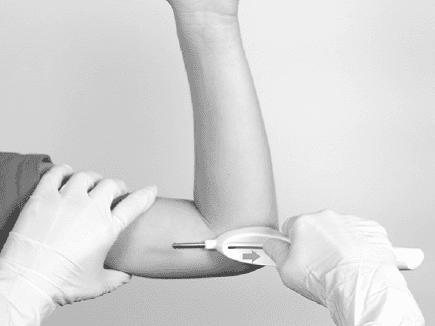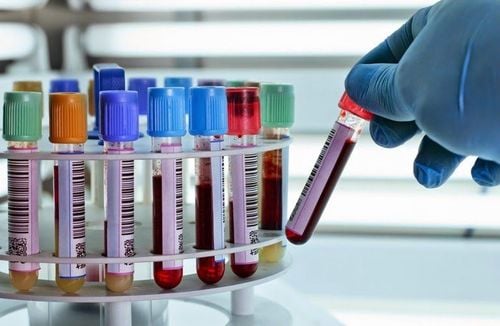This is an automatically translated article.
The pituitary gland is the main gland of the endocrine system. This gland uses the information it receives from the brain to transmit the information to other glands in the body. It produces many important hormones including growth hormone, prolactin, and luteinizing hormone (LH) that governs estrogen in women and testosterone in men.
1. Pituitary gland
The pituitary gland is often referred to as the master gland because its hormones control other parts of the endocrine system, namely the thyroid gland, adrenal glands, ovaries, and testes.
The pituitary gland is about the size of a pea and weighs 0.5 grams. It is the protrusion from the base of the hypothalamus at the base of the brain. The pituitary gland is located above the sphenoid fossa in the center of the middle skull. And it is surrounded by a small bony cavity with dural folds. The anterior pituitary gland is a lobe of the gland that regulates a number of physiological processes in the body (including stress, growth, reproduction, lactation, etc.).
Intermediate lobe synthesizes and secretes melanocyte-stimulating hormone. The posterior pituitary is a lobe of the gland that is functionally connected to the hypothalamus by appearance through a small tube called the pituitary stalk (also known as the umbilical cord).
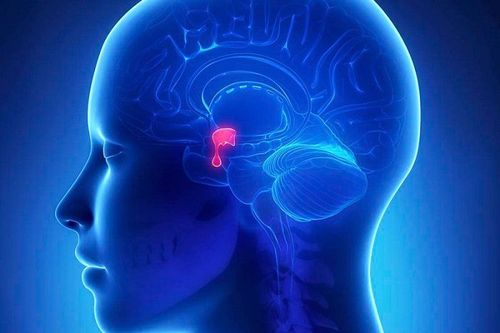
Tuyến yên có kích thước bằng hạt đậu và nặng 0.5 gram
2. The role of the pituitary gland in the endocrine system
The pituitary gland is located behind the nose, near the lower part of the brain. It is attached to the hypothalamus by a trunk-like structure. The hypothalamus is a small area in the brain, and it is important in controlling the balance of bodily functions. It also controls the release of hormones from the pituitary gland.
The pituitary gland is divided into two different parts: anterior and posterior lobes.
2.1. Anterior lobe The anterior lobe of the pituitary gland is made up of several different types of cells that produce and release different hormones, including:
Growth Hormone (GH). Growth hormone regulates growth and physical development. It can stimulate growth in most body tissues. Its main goal is bone and muscle growth. Thyroid stimulating hormone (TSH). This hormone activates the thyroid gland to release thyroid hormone. The thyroid gland and the hormones it produces are important for metabolism. Adrenal cortex (AH) hormone. Adrenal cortex hormones stimulate the adrenal glands to produce cortisol and other hormones. Follicle-stimulating hormone (FSH). Follicle-stimulating hormone is involved in estrogen regulation and oocyte development in women. It is also important in the production of sperm cells in men. Luteinizing hormone (LH). This hormone is involved in the production of estrogen in women and testosterone in men. Prolactin. Prolactin helps lactating women produce better milk. Endorphins. Endorphins have analgesic properties and are thought to be involved in the pleasure centers of the brain. Enkephalin. Enkephalin is closely related to endorphins and has a similar effect of pain relief. Beta-melanocyte stimulating hormone. This hormone helps to stimulate hyperpigmentation in response to UV exposure.
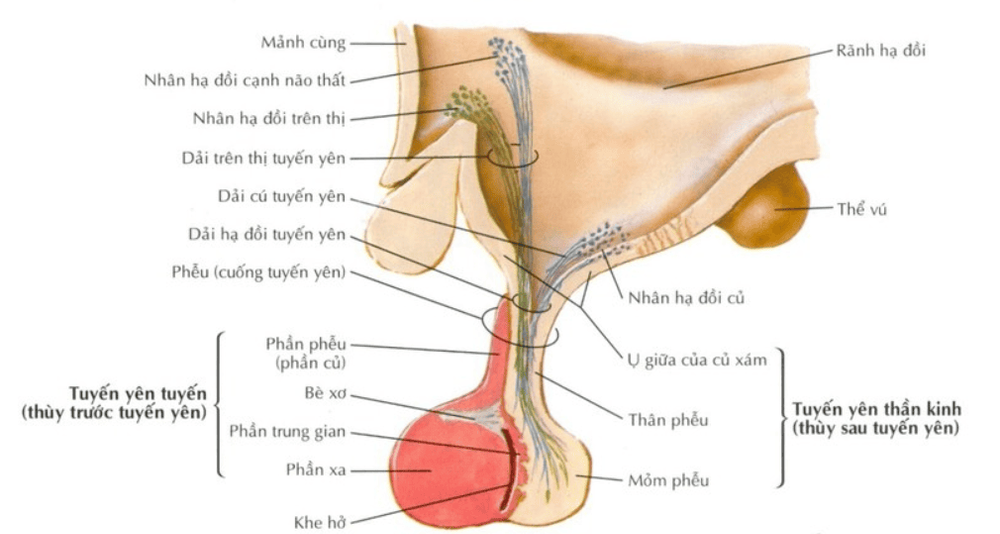
Thùy trước tuyến yên
The posterior lobe of the pituitary gland also secretes hormones. These hormones are normally produced in the hypothalamus and stored in the posterior lobe until they are released.
Hormones stored in the posterior lobe include:
Diuretic hormone or antidiuretic hormone. It helps the body conserve water and prevents dehydration. Oxytocin. The hormone oxytocin stimulates the release of breast milk. It also stimulates uterine contractions during labor.
3. Diseases related to the pituitary gland
Several conditions affect the pituitary gland and most are caused by a tumor in or around the pituitary gland. This can impact hormone release.
Some pituitary disorders include:
Pituitary tumors. Pituitary tumors are usually not cancerous. However, they often interfere with hormone release. They can also hide into other areas of the brain and lead to vision problems or headaches. There are two types of pituitary tumors as secretory and nonsecretory. Secretory-stimulating tumors secrete too much hormone, whereas non-secretory tumors do not secrete excess hormones.
These hormonal imbalances can cause problems in many different areas of the body. For example, if you have a tumor that over-secretes thyroid-stimulating hormone, you have an increased risk of developing hyperthyroidism.
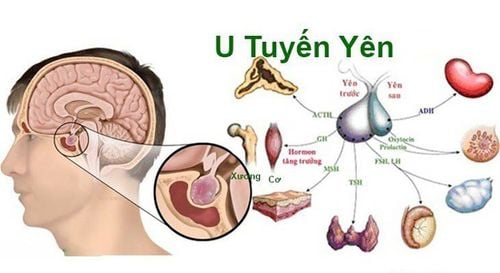
Khối u tuyến yên
Hypopituitarism . This condition causes the pituitary gland to produce little or no one or more of its hormones. This can affect things like growth or reproductive system function. Extreme limb disease. In this condition, the pituitary gland produces too much growth hormone. What can lead to excessive growth is especially arms and legs. It is often associated with pituitary tumors. Diabetes . This can be caused by a problem with the release of dilating hormone. It is usually caused by a head injury, surgery, or a tumor. As a result, people with this condition must pass large volumes of highly diluted urine. The person feels the need to drink more water or other fluids. Cushing's disease. The disease is caused by the pituitary gland secreting too much hormone directed to the adrenal cortex. This can lead to easy bruising, high blood pressure, and weight gain. It is usually caused by a tumor near or in the pituitary gland. Increased blood prolactin. In this condition, your blood contains an abnormally high amount of prolactin. This can lead to infertility and decreased sex drive. Traumatic brain injury . This condition involves a sudden blow to the storm. Depending on the injury, the blow can damage the pituitary gland and cause problems with memory, communication, and behavior.
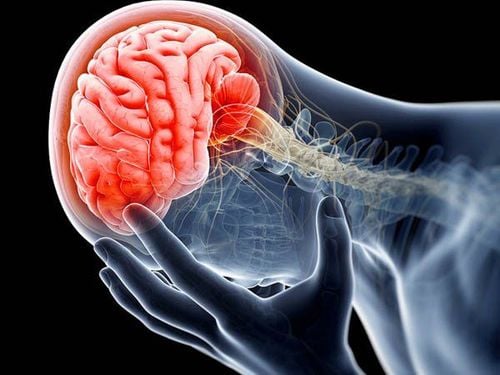
Chấn thương sọ não gây ảnh hưởng đến tuyến yên
The pituitary gland is extremely important for the overall function of the endocrine system and overall health. By working with the hypothalamus, the pituitary gland ensures that all processes inside the body work properly.
Customers can directly go to Vinmec Health system nationwide to visit or contact the hotline here for support.
Articles refer to sources: webmd.com, hopkinsmedicine.org, healthline.com, endocrineweb.com
MORE:
Treatment of hyperprolactinemia Is pituitary tumor dangerous? Hormones produced by the pituitary gland




